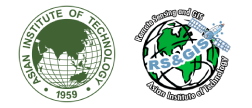FOCUS OF THE PROGRAM
The RS&GIS program at the Asian Institute of Technology is designed to provide a comprehensive understanding of Remote Sensing and Geographic Information Systems emphasizes:
- Theoretical knowledge and practical applications in RS & GIS - Space technology for digital spatial data analysis from sensors - Big geospatial data handling and cloud applications - Cutting edge technology like: Geostatistics, UAV, InSAR, GNSS, WebGIS , and Location Bases Services
